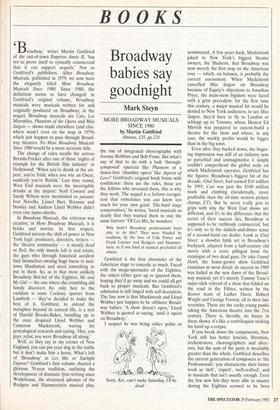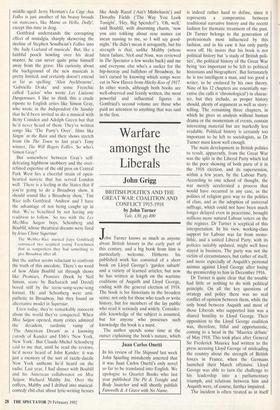BOOKS
Broadway babies say goodnight
Mark Steyn
MORE BROADWAY MUSICALS SINCE 1980 by Martin Gottfried Abrams, £35, pp.224
roadway,' writes Martin Gottfried
of the out-of-town floperoo Annie II, 'has yet to prove itself so cynically commercial that it can support sequels.' Not so Gottfried's publishers. After Broadway Musicals, published in 1979, we now have the elegantly titled More Broadway Musicals Since 1980. Since 1980, the definition seems to have changed: in Gottfried's original volume, Broadway musicals were musicals written for and originally produced on Broadway; in the sequel, Broadway musicals are Cats, Les Miserables, Phantom of the Opera and Miss Saigon — shows made elsewhere (and else- where wasn't even on the map in 1979) which just happen to pass through Broad- way theatres. No More Broadway Musicals Since 1980 would be a more accurate title.
The change of rules recalls the actress
Brenda Fricker after one of those 'nights of triumph for the British film industry' in Hollywood: 'When you're drunk at the air- port, you're Irish; when you win an Oscar, suddenly you're British.' Last time round, West End musicals were the incorrigible drunks at the airport: Noel Coward and Sandy Wilson were mentioned en passant; Ivor Novello, Lionel Bart, Bricusse and Newley and Andrew Lloyd Webber didn't even rate name-checks.
In Broadway Musicals, the criterion was creative; in More Broadway Musicals, it is bricks and mortar. In that respect, Gottfried mirrors the shift of power in New York legit: producers, directors, writers — the 'theatre community' — is mostly dead or fled; the only muscle left is real estate, the guys who through historical accident find themselves owning huge barns in mid- town Manhattan and need something to put in them. So, as in that most unlikely Broadway Brit-hit of the Eighties, Me and My Girl — the one where the crumbling old family discovers the only heir to the earldom is some Cockney sparrer from Lambeth -- they've decided to make the best of it. Gottfried, to extend the metaphor beyond its natural life, is a sort of Harold Brooks-Baker, bundling up to the once despised Lloyd Webber and Cameron Mackintosh, waving his genealogical research and saying, 'Hey, you guys, relax; you were Broadway all along.'
Well, as they say in my corner of New
England, you can put your dog in the stable but it don't make him a horse. What's left of 'Broadway' in Les Miz or Starlight Express? Gottfried's first volume charted a glorious 70-year tradition, outlining the
development of dramatic lyric-writing since Wodehouse, the structural advance of the Rodgers and Hammerstein musical play,
the rise of integrated choreography with Jerome Robbins and Bob Fosse. But what's any of that to do with a lush 'through- composed' operetta like Phantom or a dance-free 'chamber opera' like Aspects of Love? Gottfried's original book brims with confidence: these are the rules, these are the fellows who invented them, this is why they work. The sequel is a forlorn recogni- tion that sometimes you can know too much for your own good. Die-hard stage conservatives,' he writes, 'loved musicals so dearly that they wanted them to stay the same forever.' Of Les Miz, he wonders:
Why hadn't Broadway professionals been able to do this? They were blinded by tradition, by the love of Cole Porter and Frank Loesser and Rodgers and Hammer- stein, as if one kind of musical precluded all others.
Gottfried is the first chronicler of the American stage to concede as much. Faced with the mega-spectacles of the Eighties, the others either gave up or ignored them, hoping they'd go away and we could all get back to proper musicals. But Gottfried's admission is still tinged with self-deception. The line now is that Mackintosh and Lloyd Webber just happen to be offshore Broad- way babies: 'A show doesn't open,' Lloyd Webber is quoted as saying, 'until it opens on Broadway.'
I suspect he was being either polite or 'Sony, Key, can't make Saturday, I'll be dead.' sentimental. A few years back, Mackintosh joked to New York's biggest theatre owners, the Shuberts, that Broadway was now merely the first stop on the American tour — which, on balance, is probably the correct assessment. When Mackintosh cancelled Miss Saigon on Broadway because of Equity's objections to Jonathan Pryce, the main-stem bigshots were faced with a grim precedent: for the first time this century, a major musical hit would be denied to New York audiences; to see Miss Saigon, they'd have to fly to London or schlepp up to Toronto, where Honest Ed Mirvish was prepared to custom-build a theatre for the show and where, in any case, the weekly profits would be bigger than in the big town.
Even after they backed down, the linger- ing impression was still of an industry now so parochial and unimaginative it simply couldn't comprehend the global scale on which Mackintosh operates. Gottfried has the figures: Broadway's biggest hit of the decade, 42nd Street, had earned $10 million by 1991; Cats was past the $100 million mark and climbing (incidentally, more profitable than the all-time motion picture champ, E7). But he never really gets to grips with why the West End shows are different, and it's in the difference that the secret of their success lies. Broadway is supposed to be ruthlessly commercial, but it's only so in the nickels-and-dimes sense of a second-hand car dealer. Look at 42nd Street: a showbiz fable set in Broadway's backyard, adapted from a half-century old movie with a score pillaged from the catalogue of two dead guys. Or take Grand Hotel, the home-grown show Gottfried examines in most detail: its success in 1989 was hailed as the new dawn of the Broad- way musical, yet it's merely Tommy Tune's super-slick retread of a show that folded on the road in the Fifties, written by the Kismet team of Luther Davis, Robert Wright and George Forrest, all in their late seventies. These are the cocky young punks taking the American theatre into the 21st century. There is, literally, no future in these shows: it's like a ventriloquist sticking his hand up a corpse.
If you break down the components, New York still has better lyricists, librettists, orchestrators, choreographers and direc- tors, but the sum of the parts is invariably greater than the whole. Gottfried describes the current generation of composers as 'the Professionals': you characterise their better work as 'deft', 'expert', 'well-crafted', and in musicals that isn't usually enough. Even the few new hits they were able to muster during the Eighties seemed to be born middle-aged: Jerry Herman's La Cage Aux FoIles is just another of his brassy broads on staircases, like Maine or Hello, Dolly!, except this time in drag.
Gottfried understands the corrupting effect of nostalgia, sharply skewering the decline of Stephen Sondheim's Follies into 'the Judy Garland of musicals'. But, like a faithful pooch howling over his dead master, he can never quite prise himself away from the grave. His curiosity about the background of the new musicals is pretty limited, and certainly doesn't extend as far as spelling: 'Alan Ayckbourne', 'Gabriella Drake' and some Frenchie called 'Lacios' who wrote Les Liaisons Dangereuses. I like to think this a crude riposte to English arties like Simon Gray, who wrote in the Independent On Sunday that he'd been invited to do a musical with Betty Comden and Adolph Green but that he'd never heard of them. They've written songs like 'The Party's Over', films like Singin' in the Rain and their shows stretch from On The Town to last year's Tony winner, The Will Rogers Follies. So who's Simon Gray?
But somewhere between Gray's self- defeating highbrow snobbery and the over- refined expertise of the old pros on Central Park West lies a cheerful strain of open hearted naivete that has served London well. 'There is a feeling in the States that if you're going to do a Broadway show, it should sound like a Broadway show,' Tim Rice tells Gottfried. 'Andrew and I have the advantage of not being caught up in that. We've benefited by not having any tradition to follow.' Su too with the Les MizIMiss Saigon boys, Schonberg and Boublil, whose theatrical dreams were fired by Jesus Christ Superstar.
The Webber-Rice musical !says Gottfriedl convinced two sceptical young Frenchmen that as songwriters they had Something to give Broadway after all.
But the author seems reluctant to confront the truth of this anecdote. There's no word of how Alain Boublil sat through shows like Promises, Promises (book by Neil Simon, score by Bacharach and David) bored stiff by the scene-song-scene-song format. He and Schonberg were anti- pathetic to Broadway, but they found an alternative model in Superstar.
Even today, they're remarkably innocent about the world they've conquered. When Miss Saigon opened, many critics admired the decadent, sardonic vamp of 'The American Dream' as a knowing parody of Kander and Ebb's 'New York, New York'. But Claude-Michel Schonberg said to me that, until he read the reviews, he'd never heard of John Kander: it was -just a memory of the sort of razzle-dazzle New York anthems he'd heard on the radio. Last year, I had dinner with Boublil and his AMCFICall collaborator on Miss Saigon, Richard Maltby Jnr. Over the coffees, Maltby and I drifted into musical- comedy chit-chat about lyric-writing heroes
like Andy Razaf ('Ain't Misbehavin') and Dorothy Fields (The Way You Look Tonight', 'Hey, Big Spender!'). 'Oh, well,' said Boublil, with disarming charm, 'now you aire tokking about zese names zat mean nussing to me, so I will say good- night.' He didn't mean it arrogantly, but his strength is that, unlike Maltby (whose latest failure, Nick and Nora, was reviewed in The Spectator a few weeks back) and me and everyone else who's a sucker for the hip-hooray and ballyhoo of Broadway, he isn't cursed by knowing which songs were cut in New Haven from Hitchy-Koo of 1917. In other words, although both books are well-observed and feistily written, the most powerful and influential figures in Gottfried's second volume are those who paid no attention to anything that was said in the first.



















































 Previous page
Previous page